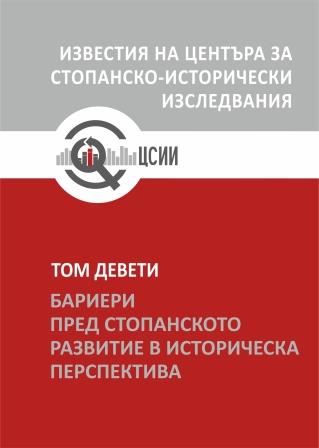Real Prices, Real Incomes, and Purchasing Power during Communism, Transition and EU Integration: Evidence from Bulgaria
Real Prices, Real Incomes, and Purchasing Power during Communism, Transition and EU Integration: Evidence from Bulgaria
Author(s): Ralitsa Simeonova-Ganeva, Kaloyan Ganev, Martin IvanovSubject(s): History, Economy, National Economy, Marxist economics, Economic history, Social history, Recent History (1900 till today), Financial Markets, Public Finances, Socio-Economic Research
Published by: Център за стопанско-исторически изследвания
Keywords: real prices; real incomes; purchasing power; communism; transition
Summary/Abstract: In this study, we consider real prices, real wages, real pensions, purchasing power, and consumption in Bulgaria during communism, transition, and EU integration. We focus on a range of essential goods representative of Bulgarian household consumption. We compile the corresponding data series based on official publications by the Bulgarian statistical authorities. The real values are computed using a unified index of consumer prices for all periods under consideration. We find that the significant increase in nominal incomes during communism, matched by administrative price controls, led to artificially high real wages and purchasing power. As this was achieved in an economy characterised by continuous shortages and accumulating inflationary pressures, we claim that the severe economic downturn and high inflation in the 1990s were inevitable. For transition, we point to the process of restoration of economic logic, the re-equilibration of markets, and the ensuing drop in real incomes as the main causes of purchasing power losses. We argue that this deterioration of real incomes manifests the price paid by society for decades of economic mismanagement. Concerning EU integration, we explain the rapidly increasing real incomes, purchasing power, and consumption with the development of the Bulgarian economy in those years, following the well-established principles of sound economic management. Notably, we demonstrate that at the end of the reviewed period, given the presence of real prices that were very close to their historical lows, real incomes and purchasing power surpassed communist-era peaks. This study contributes to the literature by providing new long term data on important economic indicators for Bulgaria. This paves the way for further research involving comparisons of the past and present economies.
Journal: Известия на Центъра за стопанско-исторически изследвания
- Issue Year: IX/2024
- Issue No: 1
- Page Range: 26-45
- Page Count: 20
- Language: English

